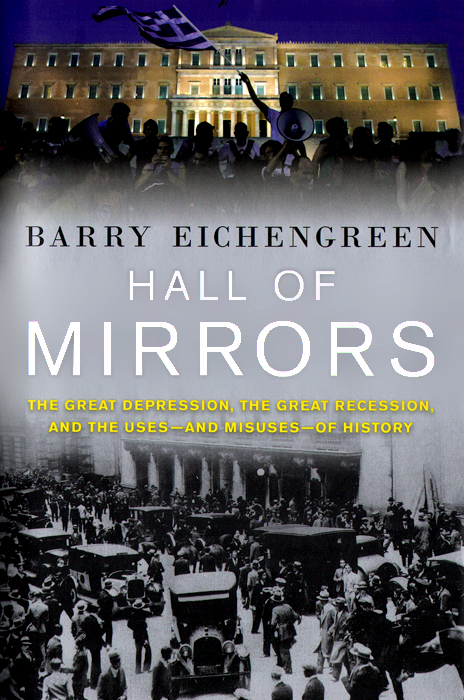Книга: Barry Eichengreen «Hall of Mirrors: The Great Depression, The Great Recession, and the Uses-and Misuses-of History»

|
The two great financial crises of the past century are the Great Depression of the 1930s and the Great Recession, which began in 2008. Both occurred against the backdrop of sharp credit booms, dubious banking practices, and a fragile and unstable global financial system. When markets went into cardiac arrest in 2008, policymakers invoked the lessons of the Great Depression in attempting to avert the worst. While their response prevented a financial collapse and catastrophic depression like that of the 1930s, unemployment in the U. S. and Europe still rose to excruciating high levels. Pain and suffering were widespread. The question, given this, is why didn't policymakers do better? Hall of Mirrors, Barry Eichengreen's monumental twinned history of the two crises, provides the farthest-reaching answer to this question to date. Alternating back and forth between the two crises and between North America and Europe, Eichengreen shows how fear of another Depression following the... Издательство: "Oxford University Press" (2011) Формат: 165x245, 512 стр.
ISBN: 978-0-19-939200-1 Купить за 2189 руб на Озоне |
Barry Eichengreen
Barry Eichengreen (born 1952) is an American
He has done research and published widely on the history and current operation of the international monetary and financial system. He received his Ph.D from Yale University in 1979. He was a senior policy advisor to the
His best known work is the book "Golden Fetters: The Gold Standard and the Great Depression, 1919-1939", Oxford University Press, 1992. In his own book on the Great Depression,
:"For a variety of reasons, including among others a desire of the Federal Reserve to curb the US stock market boom, monetary policy in several major countries turned contractionary in the late 1920's - a contraction that was transmitted worldwide by the gold standard. What was initially a mild deflationary process began to snowball when the banking and currency crises of 1931 instigated an international "scramble for gold". Sterilization of gold inflows by surplus countries [the USA and France] , substitution of gold for foreign exchange reserves, and runs on commercial banks all led to increases in the gold backing of money, and consequently to sharp unintended declines in national money supplies. Monetary contractions in turn were strongly associated with falling prices, output and employment. Effective international cooperation could in principle have permitted a worldwide monetary expansion despite gold standard constraints, but disputes over
The main evidence Eichengreen adduces in support of this view is the fact that countries that abandoned the gold standard earlier saw their economies recover more quickly.
In 2006 he published a new book, "Global Imbalances and the Lessons of Bretton Woods", MIT Press, September 2006
His most recent book is "The European Economy Since 1945: Co-ordinated Capitalism and Beyond", Princeton University Press, 2007
External links
* [http://emlab.berkeley.edu/users/eichengr/index.html Barry Eichengreen, UC Berkeley]
* [http://www.economist.com/books/displaystory.cfm?story_id=8584723 Review of The European Economy Since 1945, from The Economist]
Источник: Barry Eichengreen
Другие книги схожей тематики:
| Автор | Книга | Описание | Год | Цена | Тип книги |
|---|---|---|---|---|---|
| Barry Eichengreen | Hall of Mirrors: The Great Depression, The Great Recession, and the Uses-and Misuses-of History | The two great financial crises of the past century are the Great Depression of the 1930s and the Great Recession, which began in 2008. Both occurred against the backdrop of sharp credit booms… — Oxford University Press, (формат: 165x245, 512 стр.) Подробнее... | 2011 | 2189 | бумажная книга |
См. также в других словарях:
Barry Eichengreen — (Barry Julian Eichengreen; * 1952) ist ein US amerikanischer Wirtschaftswissenschaftler und Professor für Ökonomie und politische Wissenschaften an der University of California, Berkeley. Sein Hauptforschungsfeld sind die internationale… … Deutsch Wikipedia
Barry Eichengreen — (born 1952) is an American economist who holds the title of George C. Pardee and Helen N. Pardee Professor of Economics and Political Science at the University of California, Berkeley, where he has taught since 1987. Eichengreen s mother is… … Wikipedia
Barry Eichengreen — (né en 1952) est un économiste américain. Il est professeur d économie et de science politique à l université Berkeley où il enseigne depuis 1987. C est un spécialiste du système monétaire et financier international tant dans ses aspects… … Wikipédia en Français
Eichengreen — ist der Familienname von Barry Eichengreen (* 1952), US amerikanischer Wirtschaftswissenschaftler Lucille Eichengreen (* 1925), deutsch US amerikanische Holocaustüberlebende und Autorin Diese Seite ist eine … Deutsch Wikipedia
Barry (Vorname) — Barry ist ein männlicher Vorname. Herkunft und Bedeutung Der Name ist ein französisch keltisch walisischer Vorname. Es gibt verschiedene Etymologien des Namens; so kann er einerseits „Sohn des Harrys“ bedeuten oder andererseits „Speerwerfer“ oder … Deutsch Wikipedia
Barry J. Eichengreen — Barry Julian Eichengreen (* 1952) ist ein US amerikanischer Wirtschaftswissenschaftler und Professor für Ökonomie und politische Wissenschaften an der University of California, Berkeley. Sein Hauptforschungsfeld sind die internationale… … Deutsch Wikipedia
